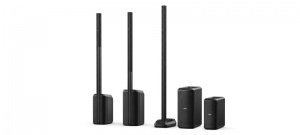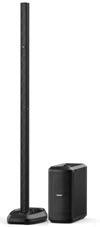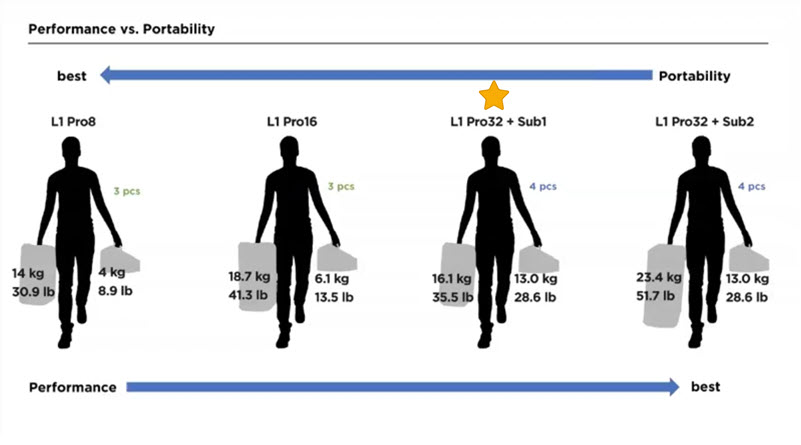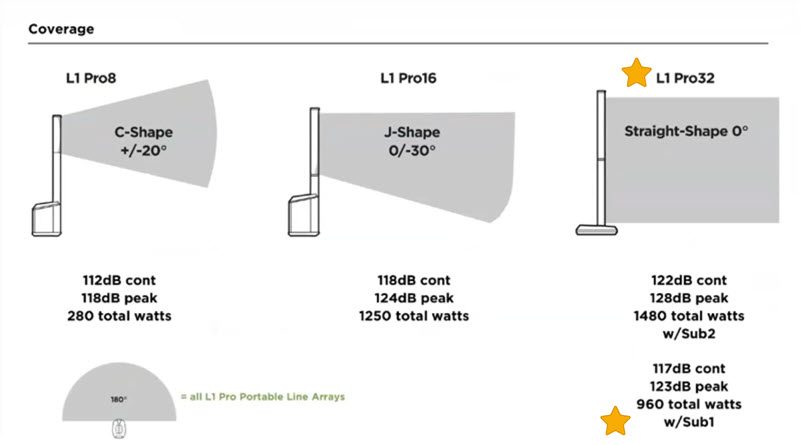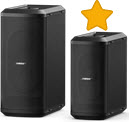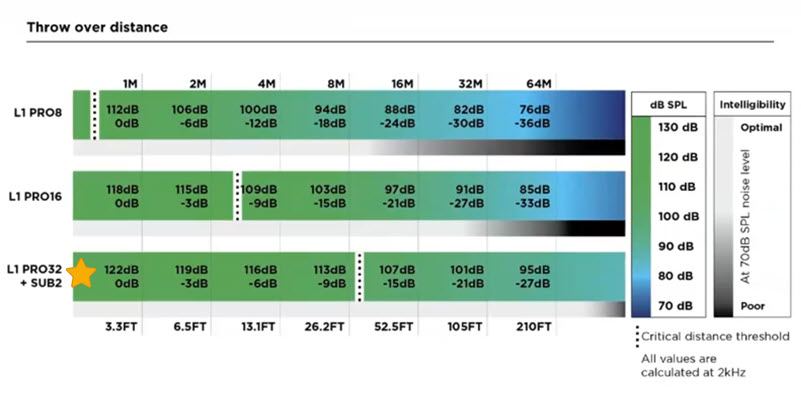Bose L1 Pro for Singer/Songwriter/Electric Guitarist
|
This article expresses my opinion and experience. Please post comments Bose L1 Facebook Group or Twitter. Thank you — ST. |
Introduction/Conclusion
I am writing this article as a singer/songwriter/electric guitarist playing solo and in bands for home concerts, in clubs, and outdoors. My views on the new L1 Pro line are different when considering other applications.
Which one did I choose?
Spoiler alert: I chose the L1 Pro32 with Sub1. Keep reading to find out why.
Given that any L1 model will sound great with 180-degree horizontal dispersion, my major considerations are portability, coverage, and stage volume vs. projection.
For Portability, I'm concerned about the size and weight of the heaviest component.
For Coverage, I am thinking about vertical dispersion. The concern is if the audience will be above or below the stage area.
For Stage Volume and Projection, I want to reach the greatest number of people, while performing with the L1 behind me. For that to work, the stage volume must be reasonable. Longer arrays do this best.
Portability
The L1 Pro32 with Sub1 strikes the right balance for me. I'm concerned about the size and weight of the heaviest component. With the L1 Pro32 with Sub1, that's the Sub1 at 35 pounds, 5 pounds more than the L1 Pro8, and 15 pounds less than the Sub2.
The footprint on the stage is 26" wide x 21" deep. There are very few places where I couldn't find room for this. For comparison, the L1 Model II footprint is 22" x 22". It's still worth noting the L1 Pro16 and L1 Pro8 take less than half the floor space of the L1 Pro32 with a sub.
Coverage
There's no one-size-fits-all solution here however, the L1 Pro32 with a Sub1 will meet my needs most of the time. The L1 Pro32 has the same vertical dispersion as the L1 Model II I've been using since 2007.
I prefer the straight shape 0-degree vertical dispersion. I get great control because there is minimal sound going up toward the ceiling contributing to unwanted reverberation. If the audience will be above or below the stage area, you'll have to consider the L1 Pro8, L1 Pro16, or F1 Model 812 Flexible Array Loudspeaker.
Sub1 or Sub2
I sing and play guitar, so I don't need the Sub2. For solo gigs where I use foot percussion, I don't need big bass. In a band situation, the low-end is provided by the rhythm section. From what I've experienced so far, the Sub1 performance is similar to the older B2, and it is smaller and lighter (Sub1 35 pounds vs. B2 40 pounds).
For live sound for a band, I would use two L1 Pro32 systems with Sub2 subwoofers or two F1 Stacks (F1 Model 812 with F1 Subwoofer). I would use the F1 systems if I need to control the vertical dispersion when the audience is above or below the stage level.
I already have two F1 Subwoofers. I didn't feel the need to get the Sub2.
Stage Volume and Projection
As I said in the introduction, I want to reach the greatest number of people, while performing with the L1 behind me. For that to work, the stage volume must be reasonable. Longer arrays do this best.
I learned from playing the L1 Model II, I can play softer while being heard by more people with a longer array. Up to a point I could reach as many people with the L1 Model 1S as with the L1 Model II, but I had to run the L1 Model 1S louder because it had a shorter array. You can see similar differences between the L1 Pro16 and L1 Pro32 in the chart below.
Since the chart above is calculated at 2kHz, the choice of Sub1 or Sub2 should make no difference.
Note: I won't run louder than 112 dB (L1 Pro8 max) on the stage but at that volume, I will reach many more people with the L1 Pro16 and even more with the L1 Pro32. Notice the white bar of vertical dots in the chart above.
If I need to throw sound out well beyond 100 feet, I'd probably use the L1 beside or in front of me and consider using the S1 Pro for a monitor.
When I first looked at the L1 Pro line, I already had all the legacy products. Among those, the L1 Model II and L1 Compact were meeting all my needs. I got the new L1 Pro32 with Sub1 because, at 65 pounds, they outperform my 100 pound L1 Model II.
L1 Pro 8
I can use the L1 Pro32 with Sub1 for most situations, so why do I have an L1 Pro8? I need it for outdoor gigs where I am playing to people above me. This happens when performing for extended-care facilities where the people are in lock-down. They open their windows or come out on balconies to hear the music. I need to project the sound upward. I could do this with the F1 Model 812, but I prefer the performance of the L1 Pro8 for this application.
The L1 Pro8 has a tiny footprint at 12.5" wide x 17" deep. The power stand is the heaviest component at 31 pounds. The weight difference between this and the Sub1 is negligible.
Portability for these outdoor gigs is extremely important because we're playing on make-shift stages and often, there are no roads or pathways to where we perform. It's all carry-in, so lighter is better.
L1 Pro16
The L1 Pro16 is the sweet spot in the family. On stage, the footprint is 14" wide x 18" deep. That's about half the footprint of the L1 Pro32 with a Sub1 or Sub2. The power stand is 4" taller than the L1 Pro8 power stand (26" vs. 22"). At a glance, the L1 Pro16 looks only slightly larger than the L1 Pro8. The big difference is the weight of the power stand. By comparison to the other units, it's a hefty 41 pounds. You can forgive this though. The bass output is similar to the Sub2. I don't need all that bass support.
The L1 Pro16 has the advantage over the L1 Pro32 because it has the -30 degree vertical dispersion. This serves you well if you are on an elevated stage. Since I already have the F1 systems, this was not a priority for me.
The images above came from Choosing the L1 Pro System That's Right for You (Youtube)
